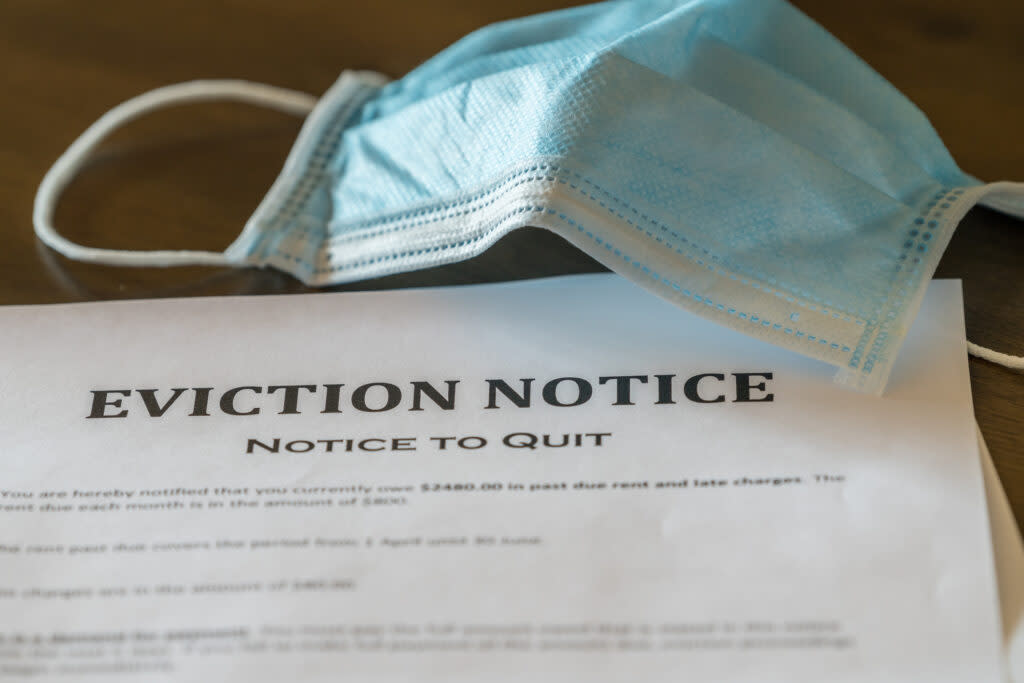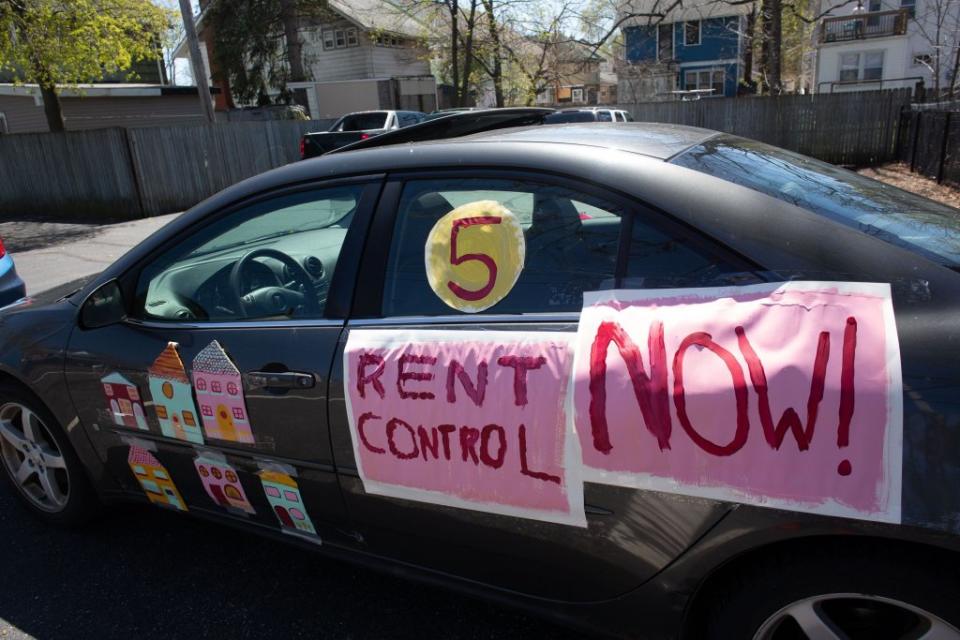COVID-era funding that’s prevented thousands of evictions is set to expire. What happens next?

Getty Images
Updated, 2:26 p.m., 5/13/24
Pandemic relief money that has prevented thousands of Michiganders from being evicted will run out at year’s end, with legal advocates concerned that tenants will once again find themselves on the short end of the lease.
Since July 2020, legal aid programs in Michigan have received additional funding as part of the statewide eviction diversion program funded through the COVID Emergency Rental Assistance (CERA) program.
The funding significantly increased legal aid’s ability to provide representation to tenants facing evictions, and currently funds 107 full-time staff. However, CERA funds for eviction prevention will lapse at the end of 2024.
That has created an inflection point for advocates who say that despite millions of dollars already spent to alleviate the issue, the full depth of the problem makes it imperative that a stable funding source be created to make sure renters are able to utilize all of their legal rights. Otherwise, increasing rates of eviction can result in negative health outcomes that help perpetuate a cycle of poverty. Meanwhile, lawmakers hope a package of bills will address more than just the financial aspect of the problem, but the systemic deficits as well.
Ann Routt | Courtesy photo
Ann Routt is the executive director of the Michigan Advocacy Program (MAP) in Ypsilanti, one of the regional legal services programs that receives the funding from the Michigan State Housing Development Authority (MSHDA), which is then administered by the Michigan State Bar Foundation in the form of grants.
“Losing 107 advocates statewide could hardly come at a worse time,” Routt told the Michigan Advance. “Housing costs continue to increase, making safe and affordable housing out of reach for many people.”
Routt said that when a tenant is facing a non-payment case, they get a notice about how much rent they owe, with as little as seven days to pay it in certain cases, and up to 30 days if they are in subsidized or federally related properties. If they don’t pay in that time, then the landlord files a lawsuit against them, and if the landlord wins a judgment, the tenant can be evicted 10 days after that. However, she said what is not clear to many tenants is that if they have counterclaims, they can raise those as an affirmative defense and potentially prevent an eviction.
That was the case for Haneen, a single mother of two who lives in Ypsilanti. She asked not to be fully identified out of fear of being blacklisted. She said she had been to court previously in a case where her landlord at the time had failed to make needed repairs, including removing mold and water that was leaking through her bathroom light fixture.
“I had lots of concerns, especially since I had kids,” she said. “I wanted to make sure that it was a safe area to live with my kids, but nothing was done. I kept asking. I called, I made requests. Nothing happened. And so when I decided to stop paying. … They took me to court for non-payment of rent.”
Haneen said she represented herself at the time in front of Washtenaw County District Court Judge Cedric Simpson, who asked Tracy Jensen, an attorney working for the advocacy program who was in court that day representing other clients to assist Haneen.
“Tracy actually helped me a lot because we got into details of what was supposed to be done,” she said. “I remember that we found out that they didn’t have any certificates of occupancy there. Just kind of seeing everything on paper was very helpful because I wouldn’t have found that information easily accessible.”
And that is exactly the type of representation that tenants need, but generally do not receive, said Jensen.
“Just to kind of give context, [Haneen] had her first case during the time of COVID when there was always a legal services person in the courtroom,” said Jensen. “She’s a great self-advocate, so she was able to use what we gave her and do really well, but that she even got to us was because we were in the courtrooms.”
The bathroom wall in Haneen’s old apartment, which she said was so soft that it caved in when she put her finger into it. | Courtesy photo
Jensen said even the most sophisticated tenants need direction as to what they can bring up in court and when they should do so.
“In the end, [they] can’t do what lawyers can do. We know the situations, we know the laws, we know how to realistically resolve and we can sort of weigh people’s issues,” she said. “But I think for many tenants, the stress on health is significant. The depression of people being evicted. … I’m not a clinician, but it is significant. So I think the service that we can provide, if we can help people the most possible, has holistically positive effects.”
Routt said the pandemic laid bare the true extent of the problem.
“There were always a great number of evictions and people would be going through, it was almost like a treadmill because we didn’t have enough resources to help them,” she said. “But having this big infusion of funding so we could help all these folks really helped us identify a lot of underlying problems that we knew were there.”
Because the courts have to be neutral, Routt said even if judges sensed that tenants facing eviction might have complicating factors, there wasn’t much more they could do than offer tenants an opportunity to present them. But most of those individuals simply are not aware of what defenses they have in any given situation, and often end up being evicted regardless.
“It was a problem that was aggravated during COVID because people lost jobs and couldn’t work, so there was this big infusion of funds to help pay the back rent,” said Routt. “But it didn’t address all of those underlying problems of complexes that had multiple repair problems or people who lived in public or subsidized housing who needed to have their rent recertified so that it reflected what their actual income was. So we see lots of repair problems, and we’re able to help a lot more of those folks, but we still don’t have enough to help everyone who needs it.”
Routt said in order to maintain what she said has been a very successful program beyond 2024, the Michigan State Bar Foundation would need $8 million annually, although it’s estimated that it would take $12 million to fully address the problems statewide.
“In 2023, legal aid programs did not have enough resources to assist 8,800 of the individuals who qualified for assistance,” states a fact sheet provided by MAP.
While current resources do not allow legal aid programs to fully represent all tenants facing eviction, advice and counsel is often provided to help litigants understand the court process and represent themselves. In 2023, that amounted to 26,251 cases that were handled by legal aid programs including everything from advice to full representation.
MAP said that from 2019 to 2020, the number of tenants who received full representation increased by 385% to 7,909, which was only made possible with the covid rental assistance funding. However, even though that emergency funding is ending, the number of tenants in need remains at pandemic-era levels — with 7,862 individuals receiving full representation in 2023.
With that situation in mind, several bills have been proposed in Lansing to provide legal reforms that will better assist tenants in knowing their rights as well as providing legal assistance when needed.
House Bill 5236, sponsored by state Rep. Carrie Rheingans (D-Ann Arbor), would require the State Court Administrative Office (SCAO) to provide tenants with a form summarizing their rights and responsibilities, as well as a list of legal resources that are available to them, including the United Way’s 211 information system.
House Bill 5237, sponsored by Rep. Emily Dievendorf (D-Lansing), goes a step further and would create the Eviction Legal Services Act, which would provide certain income-eligible individuals with access to legal services during eviction procedures. It would also ensure landlords also had access to legal services if needed.
The Economic Development and Small Business Subcommittee heard testimony on both bills April 25, where Dievendorf noted the “devastating consequences” evictions can have for families.
Rep. Emily Dievendorf (D-Lansing) attends a “The Rent is Too Damn High” rally at the Michigan Capitol on September 5, 2023 | Anna Liz Nichols
“Evictions increase the probability of applying to a homeless shelter by 14%, yet nationally, only about 3% of tenants facing eviction have access to legal representation,” she told the committee. “This imbalance of power and self versus attorney representation in the courtroom often leads to unjust outcomes. A right to counsel mitigates the harm that can come from eviction.”
Dievendorf said that in New York City, the right to counsel has resulted in 84% of represented renters facing eviction remaining in their homes, while 93% are able to do the same in Cleveland.
“By providing legal representation to those who cannot afford it, we can ensure that all parties in an eviction proceeding have a fair chance to represent their case. This not only benefits the individuals, but also contributes to the overall integrity of our judicial system,” she said.
Dievendorf also said that by providing tenants with basic legal representation, the legislation should not be seen as hampering landlords, especially the “mom and pop operations” that rent out just a few units for passive income.
“Good landlords aren’t impacted by this legislation; they just aren’t,” said Dievendorf.
When asked about the cost of creating such a program, Dievendorf noted that representation of this type is already being provided through legal advocacy groups (such as MAP), but there is currently no guarantee tenants can access it. She said when they asked MSHDA what the top line cost would be to meet the full needs of Michiganders, that number was $40 million.
“That is not what we need to authorize every year in order to make sure that we are supporting some legal services organizations and building up capacity, but it does really demonstrate that this is very much needed and that we do need to provide consistent, ongoing support,” said Dievendorf. “So rather than thinking of it as tying future legislators hands, I would think of it as allowing a real opportunity for future legislators to ensure we are keeping people in their homes and…ultimately saving money at the local level and at the state level because it is less expensive to keep people in their homes, even with a public right to counsel than it is to continue to try to shift people out.”
There is research to back up that assertion. Stout, a financial analysis company, did a study estimating the costs and benefits of providing a right to counsel for tenants facing eviction in Detroit.
There were always a great number of evictions and people would be going through, it was almost like a treadmill because we didn't have enough resources to help them. But having this big infusion of funding so we could help all these folks really helped us identify a lot of underlying problems that we knew were there.
– Ann Routt, executive director of the Michigan Advocacy Program (MAP) in Ypsilanti
“The estimated economic benefits of a right to counsel for tenants facing eviction in Detroit is 352% greater than the estimated costs of providing representation,” stated the report. “For every dollar invested in a right to counsel for low-income tenants facing eviction in Detroit, Stout conservatively estimates an economic benefit to Detroit of at least $3.52. Significant additional cost savings are likely to be recognized by Wayne County and Michigan without any incremental investment.”
The report, one of several looking at major U.S. cities, determined that the economic benefit was due to “avoided costs around shelters, health care, foster care, and other social safety net services.”
In 2022, Detroit City Council voted to provide lower-income residents with free legal representation when facing eviction, one of 16 cities nationwide to do so.
Initially funded with more than $20 million from the American Rescue Plan Act (ARPA), those funds are only available until mid-2026. Detroit corporation counsel Conrad Mallett told the Detroit Free Press it would likely cost the city between $15 million and $18 million a year to fund the program on its own.
Two other bills are also being promoted as assisting tenants.
House Bill 5238, sponsored by Rep. Jimmie Wilson Jr. (D-Ypsilanti), would allow a court to expunge records of summary proceedings if it was determined that an action by a plaintiff, usually the landlord, is “sufficiently without a basis in fact or law,” or were due to circumstances “beyond the control of the tenant that led to the eviction..or other extenuating circumstances under which the order of eviction was granted.”
Routt notes that bill has a direct connection to cases like that of Haneen, who has several default judgments on her record regardless of why they occurred or how they were resolved.
“Some landlords might look at that and say, ‘Oh she gets evicted, she doesn’t pay her rent.’ Well she was withholding her rent for good reasons,” Routt said.
House Bill 5557, sponsored by Rep. Kristian Grant (D-Grand Rapids), would require a master plan of a locality to include promotion of a “range of housing types, costs, affordability, attainability, ages, and other characteristics, including single- and multiple-family dwellings, to serve the housing demands of a diverse population.”
Lansing Tenants Union protest at Gov. Gretchen Whitmer’s residence during the COVID-19 pandemic, May 1, 2020 | Audrey Matusz
While the bills address the underlying procedural deficits that have impacted the current situation, Routt said they don’t provide the funding they and other legal advocacy groups are hoping to obtain in order to keep legal advocates like Tracy on the job. That will require a direct appropriation from next year’s budget, which is in the process of being hammered out now.
“The Legal Services Association of Michigan, which is all the directors, have been meeting with members of the legislature just to let them know that if this money ends, there are 107 advocates who will not be there to help tenants,” she said. “So we have been educating members of the legislature about this loss of funding and how it will impact all our communities.”
Routt said it’s important for both lawmakers and the public to keep in mind that the vast majority of these cases are not simply about tenants who don’t want to pay rent, but instead about disputes over issues like health and safety and whether the landlord is keeping up their obligations under the lease.
“People can withhold rent if they have significant repair problems. If you have a lip in your carpet, that’s not something you can withhold for. But if you have a significant repair issue and it affects the value of the apartment or your ability to use your bathroom, you can’t use your sink, water’s leaking everywhere, sewage is coming up, these kinds of problems you can withhold rent for, and advising people on how to do that is a useful tool,” said Routt.
“The landlord has an obligation to provide a safe, habitable apartment, and the tenant has the obligation to pay their rent, but they also have the right to live in a place that’s safe for their kids,” she said.
Correction: This story has been updated to reflect newly provided information on how quickly eviction can occur once tenants receive a notice for nonpayment of rent.
GET THE MORNING HEADLINES DELIVERED TO YOUR INBOX
The post COVID-era funding that’s prevented thousands of evictions is set to expire. What happens next? appeared first on Michigan Advance.





